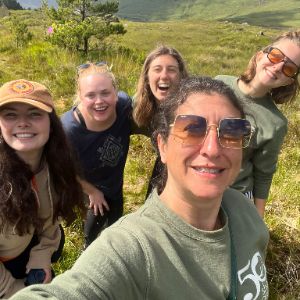Recycle Bike Hub - Our Year of Hope
Oct 03, 2021At Fifty Shades Greener, we always say that small actions do count, especially when being carried out by many. This blog series will endeavor to highlight those people or communities who are driving REAL action.
We hope their stories inspire you, and more importantly that they spark hope.
Our first story of hope comes from the Recycle Bike Hub, based in Winchester in the UK.
On first hearing about what this group of volunteers do and have achieved to date, we knew we wanted to spotlight them for our first “Story of Hope” this year.
They are achieving so much on an environmental and social scale in terms of sustainability and it’s all driven by a passion for road worthy, affordable bikes to be put back on the road, while raising funds for fantastic charities.
We are so impressed by their commitment to a circular economy model as well as the data they have measured to date from one workshop set up 2 years ago.

If you want to learn more about the life cycle of a bike and its impact – read this article which highlights that though there are carbon emissions associated with production of bikes, it is better to bike than to drive a car.
What’s even more valuable? Refurbishing and recycling bikes. And this is exactly what Recycle Bike Hub are all about.
Check out the interview with the co-founder Richard Hollingdale below.

What is Recycle Bike Hub?
Richard describes the project as "a small group of Impact Volunteers. Set-up as a stand-alone group who work in partnership with Naomi House & Jack's Place, to recycle bikes back into the Cycling Community and raise money for Charity”.
Vision: Creating GOOD from recycled bikes
Why? We believe we have the chance to make things better
How? We raise money for charity by using our knowledge to link unwanted bikes to cyclists
What? We refresh, repair or rebuild unwanted bikes, making them 'fit to ride'.
We give people the confidence to buy them, with all the money raised going to Naomi House & Jacks Place Hospices.
💡 Who is Richard Hollingdale, Recycle Bike Hub co-founder?
I’m Richard – co-founder of the Recycle Bike Hub, with my friend Luke.
A keen cyclist, a volunteer for a local children’s hospice, always active and someone who wanted to put 40 year’s commercial experience to good use as I approached the next phase of my life.
I am a want to be bike mechanic!
Fortunately, Luke is a qualified bike mechanic - We are lucky to be in a position where we can both contribute on a project where the primary benefit is received by other people.

💡What is the vision of Recycle Bike Hub?
The Recycle Bike Hub is a group of volunteers who run a bike workshop in Winchester, Hampshire. From here we refresh, repair, and rebuild unwanted bikes, making them “fit to ride”.
When we started the project, we had three clear objectives:
1: Stop bikes from being lost to landfill
2: Get more people cycling on affordable bikes
3: Raise as much money as possible for our chosen charity – Naomi House & Jacks Place Hospices.
We also measure the positive carbon footprint of the project – as best we can.
Every bike that is sold by the Recycle Bike Hub is serviced and then signed off by a qualified bike mechanic, giving the next owner the confidence to buy the recycled bike. In partnership with our chosen charity – Naomi House & Jacksplace Hospices – we sell the bikes with all the money raised helping this local charity make a big difference.
To maximise the impact for this project:
🔄 All bikes are donated
🔄 Everyone in the team is a volunteer
🔄 We work in partnership with our chosen charity to reduce costs
🔄 We obtain funds to cover the procurement costs
🔄 100% of the bike sale price goes to fundraising

💡 What was the motivation behind this project?
I believe that if everyone made an additional small positive contribution to their local community – where the primary benefit goes to someone else – the impact could be massive.
During the pandemic, we had time to slowdown, and think about solutions to problems we could see. Being a keen cyclist, I could see the benefits from getting more people cycling – these positive benefits are physical, mental, and environmental.
Luke and I joined the dots on three ideas and created a simple model that could maximize the impact in our local area.
Stop bikes going to landfill : Get more people cycling : Raise money for charity
💡 What results has Recycle Bike Hub achieved to date?
Starting with just Luke and I - we have expanded the team during the first two years (now 12 volunteers, working 1 or 2 days each week) and now have the momentum to increase the scale of our impact.
In just over two years, our one workshop has achieved:
🔄 775 bikes saved from landfill or rusting away in a garage
🔄 600 bikes sold at an affordable price
🔄 £50,000 raised for our chosen Charity – Naomi House & Jacksplace Hospices
🔄 60t of CO2e positively recycled.
Some benefits are about quality of life and are therefore difficult to measure. But these are no less important.

💡 What have been the benefits and challenges of the project?
The largest challenge we faced at the start of the project was obtaining the tools and spare parts to set-up the workshop during 2021 – when the pandemic created large gaps in the cycle industry supply chain (as with many other industries). So, we started with our own tools and at a slow pace - but the fact was that we got started.
The challenge we now face can also be flipped on its head, to show the size of the opportunity. As the project has become well known locally, we are now being overwhelmed by bike donations, and have (temporarily) run-out of storage space – we cannot believe the number of bikes that are redundant in people’s garages, which would benefit a new cyclist.
The clear benefits are those we have highlighted above.
What the workshop has already demonstrated is that the benefits being achieved are both scalable, sustainable, and inclusive.
Because it is a circular model, these benefits are greater than the sum of the individual parts.
💡 What would your main piece of advice be for other people looking to start projects to protect people or the planet?
I would have two thoughts to share:
“Start”
Don’t wait until you have every idea nailed down and every process set-up. Get started and adapt as you learn.
“Don’t overthink your project”
Stay focused and keep the project process simple. This will help to keep the project robust and deliver clear benefits.
💡What gives you hope?
I saw a sign in a local bike shop:
“The bicycle is a simple solution to some of the world’s most complicated problems.”
Think about it: we can start a lifetime of positive benefits simply by selling a balance bike for £10.
Thank you, Richard and the team, at Recycle Bike Hub for your time and insight. We wish you the absolute best with your efforts and thank you for leading the way in positive change.
If you want to follow Our Year of Hope series - sign up to our blog.
And if you want to learn more about sustainability for your personal life or for your workplace - book a discovery call with one of our experts today!
Thank you for reading today.
The FSG Team. 💚


